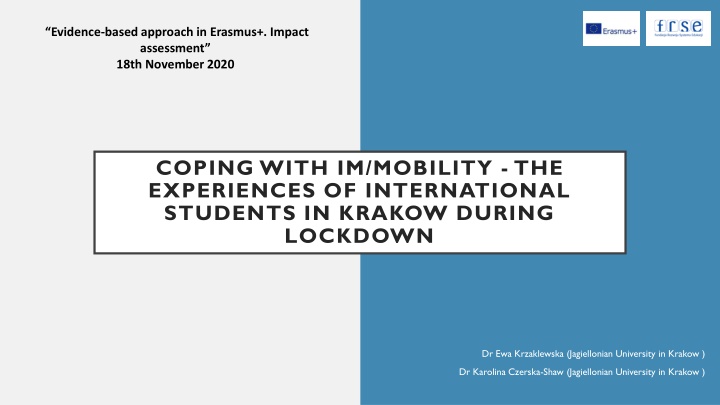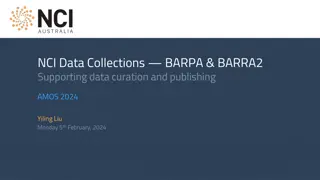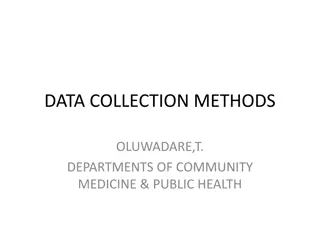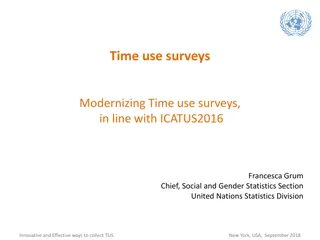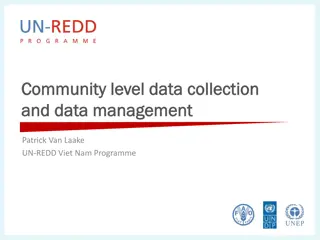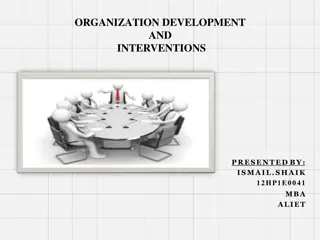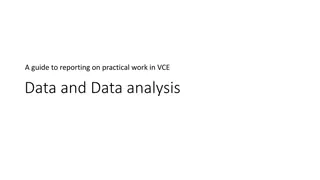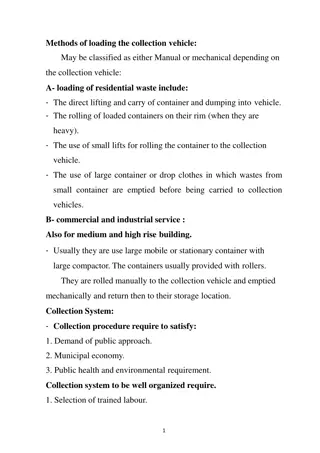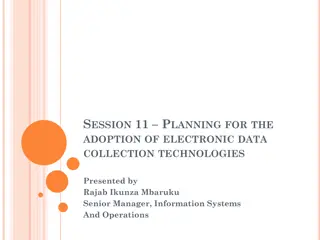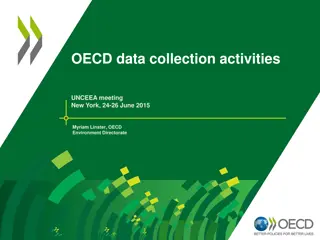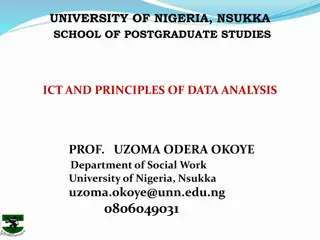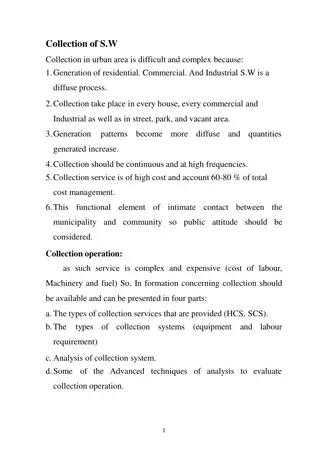Data Collection and Organization for Efficient Analysis
The concept of data handling through practical examples like recording student fruit preferences for a picnic. Learn how to systematically collect and organize data to derive meaningful insights for analysis. Discover the importance of structured data presentation in everyday scenarios.
Download Presentation

Please find below an Image/Link to download the presentation.
The content on the website is provided AS IS for your information and personal use only. It may not be sold, licensed, or shared on other websites without obtaining consent from the author.If you encounter any issues during the download, it is possible that the publisher has removed the file from their server.
You are allowed to download the files provided on this website for personal or commercial use, subject to the condition that they are used lawfully. All files are the property of their respective owners.
The content on the website is provided AS IS for your information and personal use only. It may not be sold, licensed, or shared on other websites without obtaining consent from the author.
E N D
Presentation Transcript
Evidence-based approach in Erasmus+. Impact assessment 18th November 2020 COPING WITH IM/MOBILITY - THE EXPERIENCES OF INTERNATIONAL STUDENTS IN KRAKOW DURING LOCKDOWN Dr Ewa Krzaklewska (Jagiellonian University in Krakow ) Dr Karolina Czerska-Shaw (Jagiellonian University in Krakow )
Exploratory study: -commenced in lockdown with the aim of gathering narratives of students in this particular moment of their mobile trajectories RESEARCH / METHODOLOGY -Online focus groups and interviews with 29 international students -4 expert interviews
Organisational aspects: legal status, access to information, travel restrictions Education online: methods, approach, assessment CHALLENGES IN 3 SPHERES Psychological / social well-being: support in isolation, intervention
Like, I'm still, I mean, I was never sure when and if the university was opening again. The only thing they told us was that we don't have to worry, because any decision we take it won't affect our semester, so that was the information, but we were left completely free to decide to stay or to go, so I didn't really know what to do. [woman, EU citizen, went back home] ORGANISATIO NAL CHALLENGES
EXPERIENCES IN THE ORGANISATIONAL SPHERE Access to information: Lack of prompt, filtered and streamlined information in English/Polish in relation to public services: healthcare assistance, visa/residency issues, border closures, lockdown measures, etc. Uncertainty regarding whom to contact in an emergency situation. Travel uncertainty: Decision-making uncertainty due to dissonance between personal goals vs reality; ad hoc decisions or lack of decisions made by universities Financial Instability: Stress connected with scholarship delays and uncertainty about the continuation of grants; loss of part- time jobs; access to information about financial support not always clear or available.
What is important, well, I think the university is very responsible. ( ) also our teachers, they are determined to have the lessons, to worry that we learned, so that held us international students, to say: okay I am still learning. Erasmus, Coronavirus, but still learning. (woman, EU, in Krakow) the negative - being always on the computer. At a certain point, you lose your attention, so it's like it's really difficult for me to keep up with what they say at the certain point, I just start staring at my window or at the wall. ( ) there will be 20 people connected on MS Teams while I'm speaking, but who is actually following me? So, it's more challenging in this sense, but I think that I mean it's almost the end of the semester so it's been quite good in in general, we reached what we needed to study during this month, so yeah.(women, EU, left Krakow) EDUCATIONAL EXPERIENCES
EXPERIENCES IN THE EDUCATIONAL SPHERE Missing social relations: the lack of regular, face to face social contact was unsurprisingly very difficult for international students. Monotony, social isolation, difficulties in concentration and lack of motivation. No time to forge bonds before lockdown. Inadequate learning envirnonments: some were isolated in dormatories, others in crowded parental homes. Difficulties with accessing technological tools, internet, study materials, difficulties in collecting empirical data. Course material / technological overload: switch to online learning was often accompanied by an overload of extra reading/study materials, increasing stress and decreasing motivation to study. Multitude of teaching & learning platforms.
So, feeling that I don't know when I get to see my family members, my mom and dad, and that's kind of scary. So yeah, and which kind of hampered my study at the same time. Because if you are in a room, in a city, all alone you don't have any friends, people are different, people are different. So, you are still in the process of coping and then this happens. So, you can't even concentrate on the studies. I remember, I missed writing two deadlines in one course and I had to explain the situation, like I actually couldn't focus. ( ) I didn't feel like okay, I'm all lonely here and there is no one I can talk to, or like it's just a room and I don't have anywhere to go. (woman, non- EU, in Krakow) CHALLENGES TO PSYCHOLOGICAL /SOCIAL WELL- BEING
CHALLENGES IN THE SPHERE OF WELL- BEING Psychological struggles: a critical issues for international students during lockdown, although this is a grown concern beyong the pandemic. Feelings of isolation, stress, anxiety and lack of concentration, lack of social networks. Feelings of foreigness. Accessing support: awareness of the existance of the student support centre at the university, but significant language and cultural barriers present in accessing services. Low- level anxiety/depression not deemed serious enough to seek support.
Approachability and support of administrative staff and academic teachers, including consultations, HIGHLIGHTS OF THE STUDY: POSITIVE NARRATIVES Empathy, responsiveness to emails, telephones. Prompt switch to online technological tools, including teaching and learning platforms.
Organisational issues: develop a one- stop-shop : a centralized, online information access point for international students with up to date information, translated documents and links to essential services. Educational issues: develop a comprehensive system of teacher training to suit blended/online formats, with an emphasis on student-centered, active learning and intercultural competence. RECOMMENDATIONS: HIGHLIGHTS Psychological well being: develop a mental-health awareness campaign and student support structure to accompany international students and their needs.
THANK YOU! Acknowledgements The research was conducted under the project International Student (Im)mobility in Times of COVID-19 financed by the SocietyNow!#1 competition within the framework of the Excellence Initiative program at the Jagiellonian University. We would like to thank the participants for the eagerness to share their stories with us during the difficult pandemic period We would also like to thank our research assistant, Eva Modebadze for her input and work in the project.
